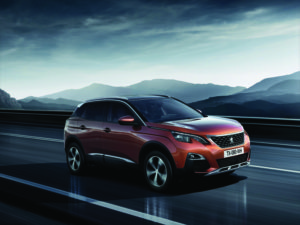Diesel continues decline in European new car registrations
New car diesel demand in Europe continued to fall in February despite an overall rise in new car registrations.

SUVs continue to drive new car registrations in Europe.
Figures from Jato Dynamics show European car registrations increased by 4.2% to 1.16 million; marking the best February performance and the highest YTD volume since 2008.
However, diesel continued to decline with its market share falling to 39.5% while volume was down by 12.8 percentage points in February. This was largely caused by falling demand in Germany and the UK, where diesel vehicle registrations decreased by 19.2% and 23.5% respectively. In contrast, petrol registrations increased by 16% in February while alternatively fuelled vehicles were up by 18.5%.
Looking at the performance of individual markets, Croatia, Greece, Hungary, Estonia and Luxembourg all posted double digit growth, while growth was also seen in Germany, Spain and France. However, the performances of these markets offset volume declines in 13 other European markets.
SUVs continued to drive growth for the industry, with volume increasing by 24.7%, accounting for 33% of the total market. Small and mid-size SUVs led the growth for the segment in February, whilst compact SUVs also had a strong month. This offset a fall in demand for full-size and luxury SUVs, which posted a 12.6% decline in volume.
PSA experienced strong growth in the SUV segment, increasing its registrations of SUVs by 80.3% in February 2018, with a total of 67,900 SUVs registered. Hyundai and Kia also increased market share in the segment due to the strong performances of the Kona and Stonic SUVs.
The subcompact segment’s registrations remained stable as decreases posted by Renault and Volkswagen were offset by increased registrations from Ford, Peugeot, Citroen and Skoda. The compact segment was the third largest in terms of market share, but volume fell by 2.4%, mainly due to a decrease in registrations of this vehicle type for Opel/Vauxhall and Peugeot. MPVs saw market share decline by 2.1 percentage points, caused by the increasing popularity of SUVs.
Overall, VW Group had another solid month, increasing its market share from 23.1% to 24.3%. This was due to the performances of its SUV range and its compact cars, which accounted for 24.4% and 27.4% of its total registrations respectively. Due to its SUV range, which is now its largest segment, PSA also experienced growth.
FCA posted the biggest decline in market share of all car groups (-0.6 points) due to decreasing demand for its Fiat (-9%) and Lancia (-42%) brands. However, Jeep posted good results due to the new Compass model, which was the brand’s best seller. Renault-Nissan also saw its market share decline in February 2018 due to decreased demand for its SUV range.
Within the car model league table, the Golf held on to the top spot, increasing its volume by 16%. The Clio remained the second most popular car in Europe, but saw its volume decrease by 2%. The Peugeot 3008, Peugeot 5008, Citroen C3 Aircross, Opel Crossland and Opel Grandland SUVs all contributed to PSA’s increased market share.
The Kuga and Ecosport also had strong months, with registrations up by 28% and 67% respectively. Both models boosted Ford’s market share. Likewise, the new Hyundai Kona and Kia Stonic accounted for 12% of Hyundai-Kia total registrations. BMW’s market share declined by 0.3 percentage points as a result of the volume of the 3-Series declining by 28.8%.
The Sandero and Duster had good months, increasing their volume by 20% and 32% respectively. Meanwhile, the 308, Astra, Panda and Corsa all had bad months, with their volume decreasing by double digits.

